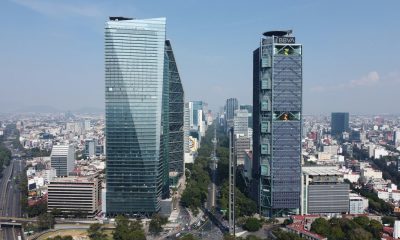Featured
QED Investors Closes Two Funds for Nearly $1 Billion to Invest in Fintech Companies
According to QED Investors, the funds raised will be used to finance fintech companies in the United States, United Kingdom, Europe, Latin America, Southeast Asia, and Africa. Mexico will be one of the main destinations to direct capital within Latin America. According to the analysis firm FT Partners, during the first quarter of the year, the global fintech ecosystem raised a total of $17.7 billion.

The venture capital firm, QED Investors, which has participated in rounds of Nubank, Credit Karma, and Klarna, among others, has mapped Latin America for future investments.
At a time when venture capital has decreased considerably for the financial technology (fintech) ecosystem, the investment firm QED Investors closed two new funds for $925 million, resources that will be used to invest in firms in the United States, United Kingdom, Europe and Latin America, especially Mexico.
This Tuesday, May 23rd, the Alexandria, Virginia-based firm announced that the closed commitments include Fund VIII, which would have up to $650 million, and Growth II, which is in a growth stage of $275 million.
This company led the Series A investment rounds of firms such as Nubank, Remitly, and Credit Karma, as well as the Series B of AdvisXchange and participated in the Series F of Klarna, in addition to being one of the first institutional investors in Greensky.
In Mexico, the firm participated in Covalto’s Series B, for which it raised just over $42 million. From 2007 to date, QED has invested in more than 200 companies, including 28 unicorns, with a special focus on the fintech segment.
Read more about QED Investors and find the latest financial news of the day with our companion app Born2Invest.
QED Investors will use the funds to further expand
According to the investment firm, the funds raised will be used to finance fintech companies in the United States, United Kingdom, Europe, Latin America, Southeast Asia, and Africa. The company confirmed to this media that Mexico will be one of the main destinations to direct capital within Latin America.
“We are excited, fortunate, and privileged to be stewards of our investors’ capital…. We are excited to have the capital to build the next generation of great fintech companies over the next cycle,” said Nigel Morris, managing partner and co-founder of QED Investors.
Announcements like QED Investors’ stand out today in the face of a complex landscape for the fintech ecosystem with respect to raising capital.
According to the analysis firm FT Partners, during the first quarter of the year, the global fintech ecosystem raised a total of $17.7 billion, a drop of just over 50% compared to the amount raised in the same period of 2022.
Although the first quarter of the year registered better results in terms of capital raised compared to the last two previous quarters, the global uncertainty caused by the turbulence in the U.S. banking industry has taken its toll on the fintech ecosystem.
Driving growth
For the executives of companies that QED Investors has bet on, the investment firm has been key to the growth of companies that have gained a foothold thanks to its value proposition in financial services combined with technology.
“QED has been an invaluable partner during critical phases of our business growth. As we have evolved to transform international payments for immigrants and their families, QED has been a constant force providing strategic guidance,” said Matt Oppenheimer, principal of Remitly, a firm focused on international remittances.
“QED has been instrumental in building our competitive advantage in secured lending. Bill Cilluffo and Nigel Morris (partner and co-founder of QED) have been instrumental over the years, true partners and always willing to support us on our journey,” noted Sergio Furio, CEO of Creditas.
With these two new funds, QED will have around $4 billion under management.
__
(Featured image by Blogging Guide via Unsplash)
DISCLAIMER: This article was written by a third party contributor and does not reflect the opinion of Born2Invest, its management, staff or its associates. Please review our disclaimer for more information.
This article may include forward-looking statements. These forward-looking statements generally are identified by the words “believe,” “project,” “estimate,” “become,” “plan,” “will,” and similar expressions. These forward-looking statements involve known and unknown risks as well as uncertainties, including those discussed in the following cautionary statements and elsewhere in this article and on this site. Although the Company may believe that its expectations are based on reasonable assumptions, the actual results that the Company may achieve may differ materially from any forward-looking statements, which reflect the opinions of the management of the Company only as of the date hereof. Additionally, please make sure to read these important disclosures.
First published in EL ECONOMISTA, a third-party contributor translated and adapted the article from the original. In case of discrepancy, the original will prevail.
Although we made reasonable efforts to provide accurate translations, some parts may be incorrect. Born2Invest assumes no responsibility for errors, omissions or ambiguities in the translations provided on this website. Any person or entity relying on translated content does so at their own risk. Born2Invest is not responsible for losses caused by such reliance on the accuracy or reliability of translated information. If you wish to report an error or inaccuracy in the translation, we encourage you to contact us.

-

 Markets1 week ago
Markets1 week agoCocoa Prices Drop Amid Speculative Selling and West African Supply Concerns
-

 Cannabis6 days ago
Cannabis6 days agoIs Aurora Cannabis Stock a Risk Worth Taking?
-

 Impact Investing2 weeks ago
Impact Investing2 weeks agoEU Eases CO2 Tax Burden on SMEs with Revised CBAM Rules
-

 Fintech14 hours ago
Fintech14 hours agoRobinhood Expands to Europe with Tokenized Stocks and Perpetual Futures
























